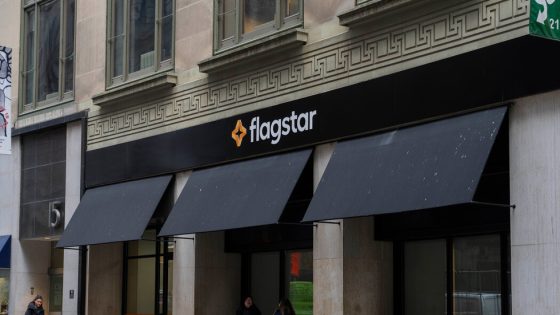A new management team at New York Community Bank is working to reassure investors after the struggling lender announced a $1 billion cash infusion led by the former Treasury Secretary Steven Mnuchin. On Thursday, the bank’s beaten-down shares jumped after executives gave investors new information about the state of the company and details about its rescue plan announced the day before.
The company’s leaders, including Joseph Otting, the longtime banking executive and close ally of Mr. Mnuchin who this week took over as chief executive, said that the bank’s deposits had fallen over the past month by more than $4 billion, or 7 percent. They also announced a cut to the dividend, the second this year, to just one cent per share.
The bank’s balance sheet will be “fortified” by the cash injection, Mr. Otting said on a call with analysts and investors, and along with a boardroom overhaul and plans to reduce the lender’s large exposure to the shaky commercial real estate market, “we have several levers to pull if needed as we continue to strengthen the foundation,” he added.
The bank’s share price rose more than 10 percent at the start of trading on Thursday, before settling to a 7 percent gain. That still left the stock down about 60 percent since the beginning of the year, as the bank has stumbled from one crisis to another, reporting billions in write-downs and raising concerns about the accuracy of its previous financial reports. The bank’s stock spiraled and its bonds were downgraded by credit-rating agencies.
During another lurch downward in the bank’s shares on Wednesday, trading was halted and late in the afternoon the $1 billion deal was announced, which appeared to stabilize the lender. “We view the capital raise as a much needed step in the right direction, taking the worst case scenario, at least temporarily, out of the narrative,” analysts at Stephens wrote in a research note on Thursday.
Analysts at Fitch, a rating agency that recently downgraded the bank, called the cash injection “a positive near-term development” but warned about the “ongoing ambiguity related to the firm’s strategic direction and business mix.”
The Hicksville, N.Y.-based bank operates more than 400 branches under brands such as Flagstar, one of the county’s largest residential mortgage servicers, and runs an outsize loan book tied to rent-regulated apartments, whose values have suffered because of laws that restrict their ability to profitably improve the properties.
The bank’s executives told analysts Thursday that it would diversify its loan portfolio and look to sell assets to bolster its balance sheet, among other cost-saving measures. The dividend cut was a “bitter pill to swallow” for some investors, said Christopher Marinac, director of research at Janney Montgomery Scott.
Regulators in Washington are eager to avoid another banking crisis close to the one-year anniversary of the collapse of Silicon Valley Bank. It and other lenders that failed last year — including Signature Bank, which was eventually acquired by New York Community Bank — were felled after losing a torrent of deposits.
A large share of New York Community Bank’s deposits are insured by the Federal Deposit Insurance Corporation, which covers deposits of up to $250,000. Around 80 percent of the bank’s deposits fall under that threshold, the bank said Thursday, far more than at the banks that failed last year. This may have prevented a more dramatic deposit decline, Mr. Marinac noted.
Source Agencies


